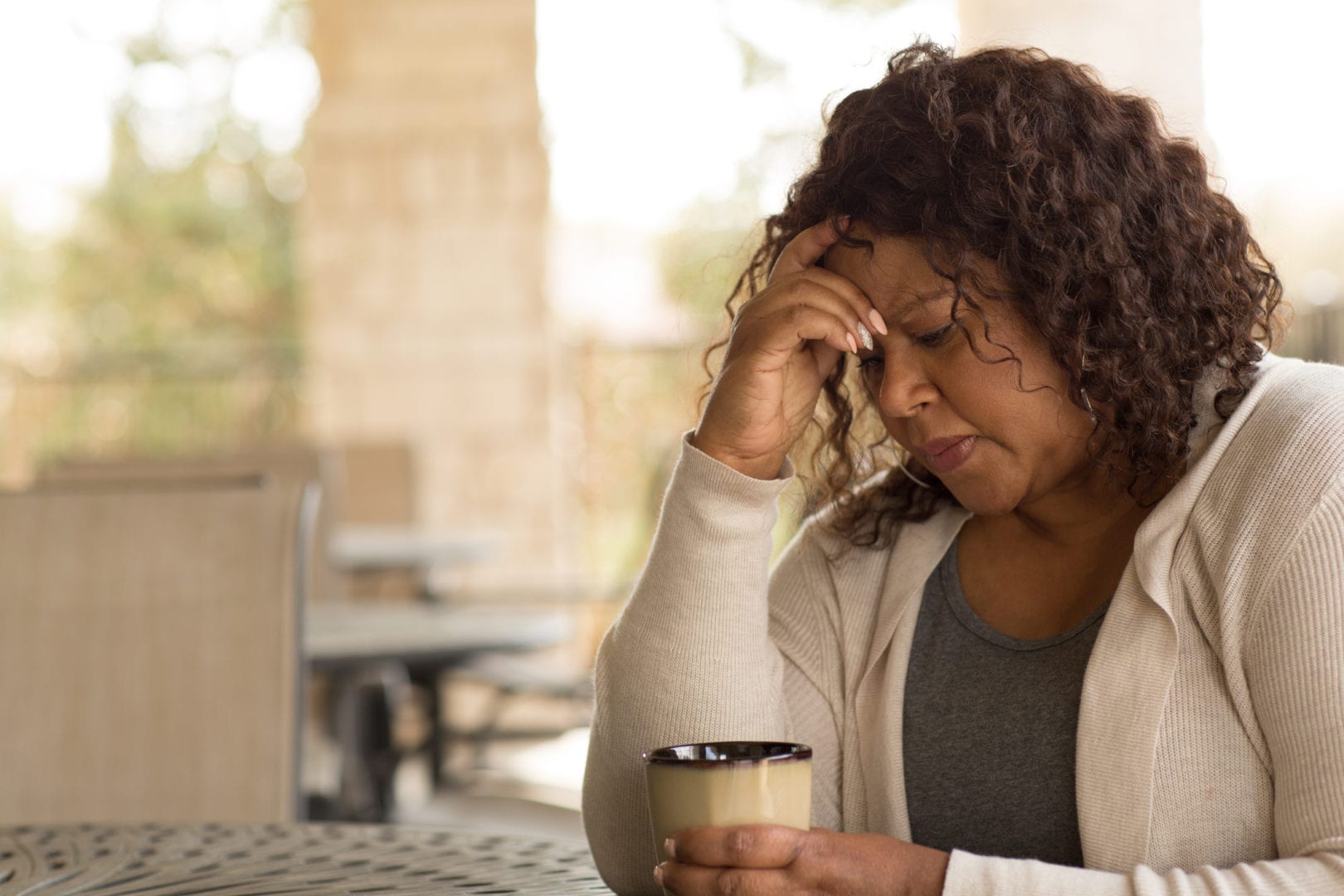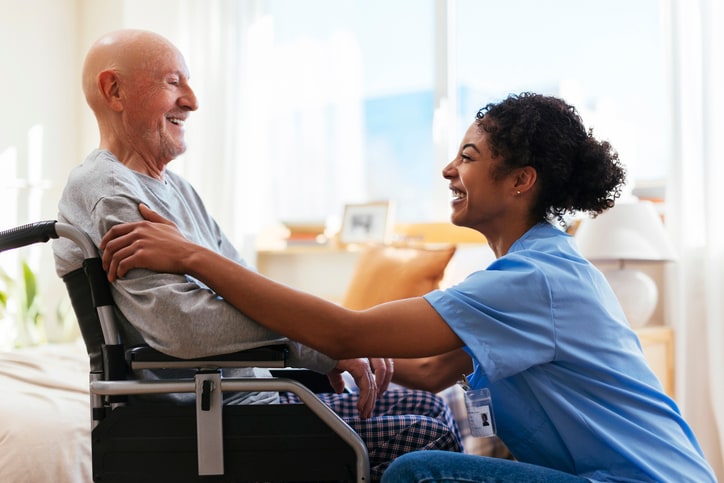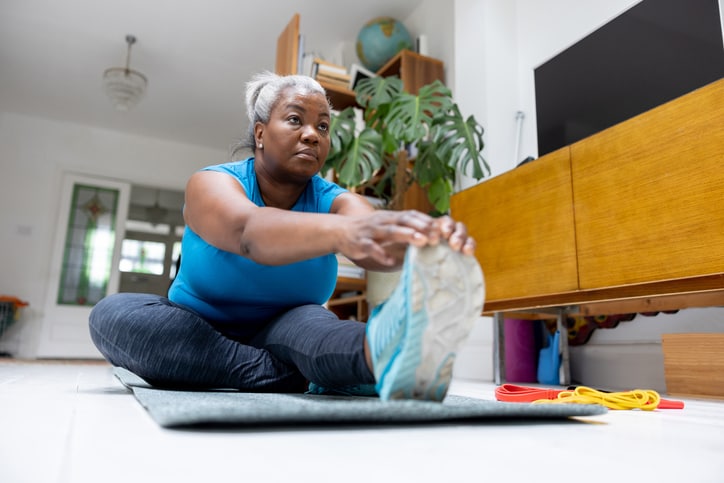When you’re caring for a loved one who is aging or ill, people will often say things like “You’re so brave” or “I couldn’t do what you do.” But most of the time, you don’t feel especially brave or heroic. Although caring for a senior can be incredibly rewarding, a lot of the time you might feel overwhelmed or exhausted. That’s when you’re at risk for caregiver burnout.
Nearly 4 in 10 caregivers consider their caregiving situation to be highly stressful (36% rate stress at 4 or 5 on a 5-point scale), while an additional 28% report moderate emotional stress, according to the most recent AARP report, Caregiving in the U.S. Additionally, in 2023, the AARP reported that caregivers spend an average of 26% on their income on caregiving activities, which may serve to compound the stress.
To avoid caregiver burnout, it’s vital for caregivers to use coping strategies and find ways to put themselves first. This will help not only with their well-being, but it will also make them better caregivers. Here, experts share the signs of caregiver burnout and offer tips to prevent it before it starts.
What is caregiver burnout?
Caregiver burnout is “a state of physical, emotional and mental exhaustion,” according to the Cleveland Clinic. It may be accompanied by “a change in attitude — from positive and caring to negative and unconcerned.”
Ellen Barry is an actress and theater administrator who cared for her husband, Paul, for eight years between his diagnosis for throat cancer and his death in 2015. During that time, he went from being a powerful King Lear to a man who couldn’t speak or eat and who needed both his feeding and tracheotomy tubes cleaned several times a day.
Caring for Paul meant driving him to chemo and radiation treatments or driving to his rehab facilities each day; keeping track, via an Excel spreadsheet, of the medications and equipment; managing receipts for Medicare reimbursement; going to the doctors’ appointments with a tape recorder and later transcribing the notes; getting and replacing oxygen tanks and making sure Paul used the oxygen as needed; cleaning Paul’s wounds, changing his linens and waking up when he needed help breathing several times a night. For eight years.
“I was aware that one could burn out,” she says. “But part of it was me being hero-Ellen.”
Signs of caregiver burnout
There are definitive signs of caregiver burnout. The Mayo Clinic provides a comprehensive list, and possible red flags may include:
- Your sleep is suffering. Are you waking up in the middle of the night? Taking forever to fall asleep? This is a common sign of stress overload.
- You’re unusually irritable, angry or sad. Barry noticed she had occasional meltdowns. Are you suddenly snapping at loved ones, which isn’t in your nature? Losing your patience with slow sales clerks? When you’re already stretched to the breaking point, it’s much harder to manage your emotions. Mood swings and irritability can also be signs of depression. (Other symptoms of depression include feelings of sadness or hopelessness, changes in appetite, lack of energy and loss of interest in things that used to bring you pleasure.)
- You’re drinking or smoking more. Do you feel like you need two or three glasses of wine at the end of the day, every day, to unwind?
- You have no time for personal care. You might look in the mirror and think, “When was the last time I brushed my hair?” Or you’ve totally abandoned even attempting an exercise routine.
- You’re constantly sick. Stress can affect your immune system. In fact, research has shown that caregivers have lowered immune response. They’re also more prone to ailments like acid reflux, headaches, and aches and pains.
- You’re pinning your hopes on an unrealistic change of events. “One way I check is I ask a caregiver [who looking after an older adult with Alzheimer’s or dementia], ‘What would make this better for you?’ says Epstein, “And if the only answer is, ‘For them to cure this disease,’ then I know this person is not in reality and needs help.” That use of magical “win-the-lottery” thinking, Epstein says, indicates hopelessness and exhaustion.
“There’s no blood test for burnout.”
—Cynthia Epstein-Smith, licensed clinical social worker
“There’s no blood test for burnout,” says Cynthia Epstein-Smith, licensed clinical social worker, who is the clinical mentor for the NYU Langone Alzheimer’s Disease and Related Dementias Family Support Program. “It’s a chameleon — it shows up as depression, or apathy, or acting out, or being irritable, or abusing alcohol or any number of symptoms. So we treat the symptoms: A doctor might put the caregiver on antidepressants because they seem depressed.”
Coping strategies to prevent caregiver burnout
Everyone will tell you: “Take care of yourself!” or “Get help!” Your first instinct might be to think of all the reasons you can’t. “And many of those reasons are valid,” Epstein says.
If you’re a senior caregiver, you might find it tough to squeeze time for yourself in between your professional and personal responsibilities. If you’re a family caregiver, you may not be able to hire a nurse or get particular family members to pitch in, says Epstein. “But the one thing you’ve got to do is understand you have a life that is valuable, apart from your role as a caregiver,” she says.
Epstein points out that many caregivers, when you ask how they are, will answer with how their patient is. That’s the key: You can’t lose your own identity in the process of caring for another.
“When you have a kid, and that kid starts acting fussy and not sleeping well, you think, ‘I’ll bet he’s coming down with a cold.’ Well, caregivers don’t think, ‘Maybe I’m coming down with burnout.’ But you have to.”
—Cynthia Epstein-Smith
You don’t have to make one big change that fixes everything. As you know, that’s not even possible. But you can make small changes, one at a time, that will build themselves into bigger and bigger changes to give yourself some breathing room. Here are a few small steps to take.
Name the problem
“When you have a kid, and that kid starts acting fussy and not sleeping well, you think, ‘I’ll bet he’s coming down with a cold,’” says Epstein. “Well, caregivers don’t think, ‘Maybe I’m coming down with burnout.’ But you have to. You can only contend with this so long.”
Take five
Carve out five minutes a day to look out a window, water a plant, breathe. If even five minutes feels challenging, try two minutes. If you’re tech-inclined, an app such as Headspace, Calm or MyLife can provide short, guided meditations to grant you a tiny respite.
Walk 20 minutes a day
If you can walk more, walk 30 minutes a day. If you can do it outside, great; if you do it on a treadmill, great. If you bring your loved one to a park and walk in circles around them, great. But move your body. It lowers your blood pressure, regulates your blood sugar, improves your brain function, releases endorphins and lowers your cholesterol. Yes, even if you only do 10 minutes.
Be creative
Literally. “I’m running a support group now, and I’ve begun incorporating writing into it,” says Epstein. “I let the group start talking, and then we extract a core issue and write about it for five to six minutes. It’s taken people to much deeper places than expected.”
Get out when you can
If you’re a family caregiver, ideally, you’d be able to find respite care — someone who can spend time with your loved one so you can have time for yourself. But even if you can’t go out alone, finding outside activities that you and your client or loved one can do together can replenish you. “You might be able to go to an afternoon concert together,” notes Epstein. Look for things you can do, particularly around music and art, that echoes something you both used to enjoy. For people with dementia especially, music can be therapeutic and even unlock memories.
Ask for help
Paying for extra help, if you’re a family caregiver, may seem out of reach. As Barry remembers, “Even after Medicare and secondary insurance, we owed thousands. I couldn’t see spending the money.” But can you get someone from your church to come sit with your loved one for an hour while you go out for coffee or get a haircut? Could you ask your best friend or niece to drop by on the weekends and do a few loads of laundry? Think about what kind of help would be most useful to you.
Confide in someone
For Barry, her daughter, a tight-knit group of friends and an amazing yoga instructor gave her the emotional space to complain, to laugh and to be herself. If you’re the confidant, resist the urge to say, “I know what you mean, I had something similar happen,” and just say, “How are you feeling?” Barry also saw a professional therapist. Consider your local psychoanalytic training institute, which might offer free therapy if you can commit to a set number of sessions.
Find organizations that can help
Epstein says that even if you don’t live in the New York area, the Langone Alzheimer’s Disease and Related Dementias Family Support Program will help you find resources near you. The Family Caregiver Alliance has localized maps to help you find support.




